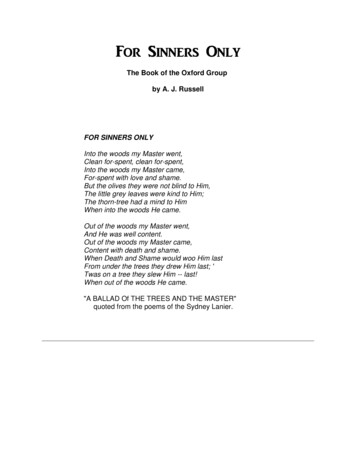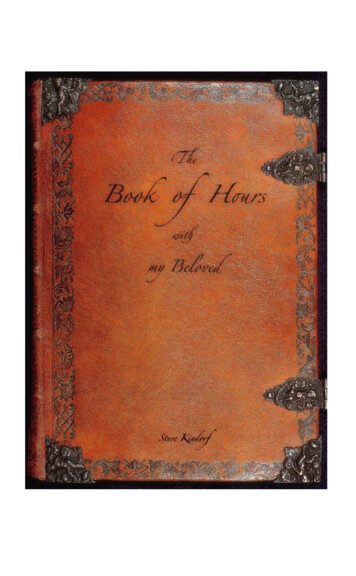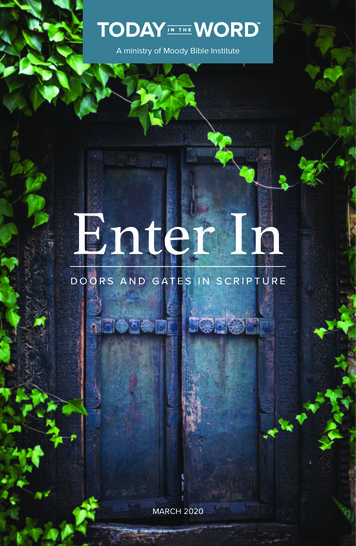
Transcription
For Sinners OnlyThe Book of the Oxford Groupby A. J. RussellFOR SINNERS ONLYInto the woods my Master went,Clean for-spent, clean for-spent,Into the woods my Master came,For-spent with love and shame.But the olives they were not blind to Him,The little grey leaves were kind to Him;The thorn-tree had a mind to HimWhen into the woods He came.Out of the woods my Master went,And He was well content.Out of the woods my Master came,Content with death and shame.When Death and Shame would woo Him lastFrom under the trees they drew Him last; 'Twas on a tree they slew Him -- last!When out of the woods He came."A BALLAD Of THE TREES AND THE MASTER"quoted from the poems of the Sydney Lanier.
Table of ContentsChapter One. 4THE VOICE FROM THE BLUE . 4Chapter Two . 10The Three Troubadours . 10Chapter Three . 19SEX AND MONEY . 19Chapter Four . 31THE LIFE-CHANGER . 31Chapter Five . 41THE FIRST HOUSE-PARTY . 41Chapter Six . 50THE OXFORD GROUP . 50Chapter Seven . 59A MOTOR CLUB BLOWS UP . 59Chapter Eight . 66FRANK ACTS . 66Chapter Nine . 71RESTITUTION . 71Chapter Ten . 83THE OXFORD HOUSE-PARTY . 83Chapter Eleven . 89THE HUMAN ENGINEER. 89Chapter Twelve . 104A JOURNALIST’S STRANGEST JOURNEY . 104Chapter Thirteen . 116BILL PICKLE . 116Chapter Fourteen . 128THE CALVARY MIRACLE . 128Chapter Fifteen . 136GUIDANCE AT WORK . 136Chapter Sixteen . 147AN IDEAL HOME. 147Page 2
Chapter Seventeen . 158A MODERN WIFE’S ADVENTURE . 158Chapter Eighteen . 166THAT KNOTTY MARRIAGE PROBLEM . 166Chapter Nineteen . 173AN OXFORD PSYCHOLOGIST SPEAKS . 173Chapter Twenty . 181SPIRITUALISED SCHOLARSHIP . 181Chapter Twenty-One . 189THE STUNG CONSCIENCE . 189Chapter Twenty-Two . 193WHAT SIN IS . 193Chapter Twenty-Three . 201THE SPIRIT MOVES . 201Chapter Twenty-Four . 211AS FOR ONE SINNER ONLY . 211Page 3
Chapter OneTHE VOICE FROM THE BLUEThis is a book about sinners, for sinners, by quite a big sinner.You may not like it. You may even hate it, as some are sure to do.You may dislike the theme, for, though it introduces lovely people, it comes to grips withan unlovely subject. And solves its riddle.You may dislike the characters as they are limned in print, but not in real life. As they areall living, you may encounter them yourself some day, and discover their excellence. Atleast one will live on as an historic figure when this generation has merged with the ages.Perhaps many.Meanwhile, none can disprove the contents of this book or avoid its challenge. The storyis true; the challenge is to you.From the end of 1923 until the middle of 1926 I was Literary Editor of perhaps the mostvirile and progressive London daily newspaper. During that period certain eventshappened which drew me into the heart of the most astonishing group of people I shallever meet. To-day groups of them are sprinkled about the earth changing the lives ofthose they encounter, giving all they possess and asking no return.They are not an organization. None can tell their number. For in their own words: "Youcan't join; you can't resign; you are either in or out by the quality of the life you live."They are probably the most extraordinary association of Christian adventurers since thefirst century. It is much too early yet to forecast their destiny. Their movement, in itssweep, may take one of two forms: it may become just another gem or facet ofChristendom like those affectionately associated with Augustine, Francis, Luther, Wesley,Booth, and Moody; or it may speed up the reunion of Christendom, even Catholic andProtestant. It may revive first-century Christianity in every denomination, expelcompromise from the lives of nominal Christians, make the church a true healer of brokenhomes, give purpose and direction to purposeless and misguided lives, set aloft to a fierycross in every office, workshop, and institution, and really start the Christian millenniumin this our twentieth-century.As Literary Editor my job was to provide compelling newspaper features to engage thepublic interest and expand our circulation. In a surprising manner I stumbled on twounusual means of achieving my purpose, which I found word two cardinal practices of theamazing group I was subsequently to meet. I called these means Inspiration andConfession. They called them Guidance and Sharing.Page 4
It was Saturday, my free day, usually spent in my garden at Kent. Not that I enjoyedgardening, but it was a good exercise and kept me from the race-course, where I hadspent many more exciting and inexpensive holidays.I worked on, thinking of nothing in particular. Suddenly a strange experience came to me.There seemed to be a faint electrical crackling in the clear air about me. There waspositively nobody else in the garden, but someone or something spoke to me: a voicethat was audible and yet (paradoxically enough) quite soundless. That seems the onlyway to express what I shall always believe was a supernatural experience.I felt a message impinge on my brain from the air. It alighted softly like the caress of aleaf or the touch of a gentle zephyr. It was accompanied by a sense of exaltation bothpleasurable and unforgivable.As to the message, there was nothing particularly striking about it, though when translatedinto action it produced phenomenal results. At this stage I do not clearly remember theexact phrase that came. I was just told to get twelve novelists to confess their religiousbeliefs in our newspaper. Apparently a good idea, but nothing to differentiate it from othersthat have come to me and thousands of other people. Only -- that queer feeling of itsbeing implanted from without, perhaps for some specific purpose. And the pleasurablephysical and spiritual reaction which attended it.Almost immediately afterwards, both the idea and the incident tucked themselves awayin the recesses of my mind and were completely forgotten for several months. Then oneday, in early September 1924, I was asked to provide a good series for an autumncirculation-raising campaign on which a fairly large sum of money could be spent inpublicity.I went back to my room and began to think. Then the memory of that spring day in mygarden returned. Intuitively I knew that here was the right subject ready prepared. It wasfortunate I had forgotten the message until now, the ideal period of the newspaper yearto launch a new series. It would just catch the public returning from the holidays for theautumn.Before then and since, when advocating other ideas on which large sums of money hadto be risked, I may have felt trepidation. The arguments for were these; the argumentsagainst were those. But this time I had a subtle confidence that some mysterious forcesupported the proposal and that nothing could prevent it succeeding. Naturally,psychiatrists would throw doubts on the supernatural origin of this series, and ascribe myexperience to an emotional disturbance of the endocrine glands; or something thrown outby the subconscious. Let them. But I wish they could make those same glands work orthat same subconscious self get busy whenever I am in need of help.It is comparatively easy to get a good idea accepted, but far harder to get a company offamous novelists to come in on it, sensitive as they are to their own dignity and status,especially when it means disclosing their private life to the curious multitude. Ten writersPage 5
of outstanding eminence, all well known in England and most of them well known inAmerica, were intrigued by our extraordinary request and readily agreed to contribute.They were:Arnold Bennett.Sir Arthur Conan Doyle.Henry Arthur Jones.Israel Zangwill.J. D. BeresfordHugh Walpole.3Compton Mackenzie.Rebecca West.E. Philips Oppenheim.H. de Vere StacpooleI forget why the number of novelist contributors was reduced from twelve to ten, the figureI had been given, but I remember this series ended far too soon, although we added onearticle from an anonymous correspondent, a second by Sir Arthur Conan Doyle, and twoextra by the Bishop of London.Giving “an unknown man” a chance to join up with some of the best writers in Englandwas a happy idea (suggested by “The Unknown Warrior”) which proved very popular. Ofthousands essayed to air their religious views in conjunction with celebrated novelists. Iselected the winning article because It contained an illuminating reference to a commonfailing of our readers and of myself; and because it was a clear statement of simpleChristian faith that the masses would understand.“The gambling instinct,” said the Unknown Writer, “so often perverted and used forunworthy ends, is one of the most valuable Instincts processed by man, and nowheredoes it find a truer or more complete outlet and fulfillment than in religion. . . .” The writercontinued: “Religion is betting your life and there Is a God. I decided to bet my life therewas a God, and more and more as the years go by I find that in so far as I yield up mywill to God and open my heart to His indwelling, in so far as I try to live out my life in theChrist-spirit, the experiment works!”Here, I thought, was something different for our friend the gambler: the man who was soconsistently accused of being in the wrong -- praise from the quarter which usuallyattacked him. His praises could be used to prove Christianity. God wanted gamblers.Back God and watch Him win your own Derby. Perhaps an old idea to some in theChurches, but to the average gambler it was NEWS.A born gambler myself, I had indulged a gambling instinct in the City, the casino, on therace-course. Like all gamblers, I had my successes. An occasional brief spell of victory,and then losses. Invariably I ended every gambling bout with a deficit balance, however“inside” the information -- and I was often right inside being “inside” -- however posh isthe gamble, however long or short I went or held on. At last I came to believe that somelittle imp of misguidance had been specially delegated to perch himself at my ear andwhisper the wrong advice whenever I gambled.Page 6
Curiously enough, I was shortly to find the gambling instinct strongly in evidence amongthe group of people I am about to describe. They are gamblers all; gambling recklesslywith their own lives -- gambling on God.As only “unknown men” and had been asked to contribute the eleventh article, I wasamused to hear a laughing feminine voice at the end of my telephone announce that shewas the author of the anonymous article we had just published. To make quite certain, Iasked for a specimen of her handwriting. It corresponded with the written article. I askedher if she wanted money. She said “No.” Further proof. And she called -- tall, thirtyish,and attractive, she seemed to me. I asked her who she was. She hesitated. She askedme to promise never to publish her name; and I promised.There are princesses in the movement dealt with in this book. But without that saying thatshe is a princess, I can state that her home is an English palace, though she was notliving in it. At the time she was suffering from an apparently incurable disease, but hadgiven her life to social work in a London slum. As her illness Her indoors for a good partof the day, I advised her to drop her self-immolation in squalor and returned to the countryand sunshine. She laughed at my lack of understanding, and went back to her socialservice. Some years after, she wrote me a letter appreciating the work of the peopledescribed in this book and reminding me of my bad advice. Instead of going to the countryfor a sunshine “cure,” she had worked on in the slum for her Lord -- and been marvelouslyrestored to health!She told me a had written her manuscript for “My Religion” under what she believed to be“direct guidance,” although not without trepidation, as she saw the invitation was onlyextended to men. But she had written a letter of explanation giving her full name, whichsomehow escaped my notice. Her article came to me interred in a high pile ofmanuscripts, written on both sides of the paper (sin of sins in journalism). The opinionwas more than once expressed that her contribution, breathing as it did the spirit ofconfident faith and loving understanding of the prodigal mind, was the best of all. I amsure it did the most good.Contributors to the “My Religion” series were not hampered by editorial restrictions. Theycould advocate whatever religion gain shows. If they had none, they could let their articleexplain why, provided there was no blasphemy. Judged by their writings, they were not adeeply spiritual company. Some were believing Christians; some were agnostics; all werehonest. Compton McKenzie (a great writer) wrote a strong plea to Roman Catholicism,and the late Sir Arthur Conan Doyle for Spiritualism. I enjoyed the article by HughWalpole, who revealed himself as the typical son of a bishop. His article was well-liked,as was that Rebecca West, who wrote with her usual brilliance. Not one tried to definethe word Religion, but that omission was atoned for by Father Roland Knox, who, becauseof the interest awakened by this and subsequent religious series, which this one evoked,wrote a book dealing with the phenomenon of Feet Street’s sudden interest in religion.His title was uncomplimentary, though he was not unfriendly. It suggested that we wereCalibans of Grub Street. There was no congestion that we might be practical mystics.Page 7
Father Knox showed us that religion was something which restrained us from doing whatotherwise we might do, just as conquered people were restrained by their conquerors,foot on neck, in the bad old days when power was as much synonym for right as moneyis to-day.Many beautiful passages were contained in the articles written by these representativenovelists describing their religion. Outstanding among them, like St. Paul’s Cathedral,was a marvelous symphony in prose by that delightful playwright, Henry Arthur Jones,which is surely destined for immortality. Its sheer beauty stood out in clear relief as I readthe article, and has haunted me ever since. I turned to my little staff and read it over fortheir delectation. Listen to the song behind the screen of words, the yearning and theheartbeat of a lovable Englishman:Whatever call to wander in strangely haunted spheres of ether, or fields asphodel, in newmoods of being, amid new duties and new pleasure; whatever call to prolong and fulfill itsexistence my spirit may obey when it has earned its release from the flesh, it is to thisearth that it turns and returns and passionately clings to-day; this earth that is the motherof all I’m know and feel, this earth where I have lived and sinned and suffered and lovedand fought and stumbled and tramped and despaired and laughed and wept and eatenmy fill and drunk deep draughts of pleasure and success and bitter cups of misery anddefeat and shame; this earth whose dawns and sunsets and variegated pageantries arenicely suited to my eyes and her harmonies and discords exactly tuned to my years; thisearth whose biting winds and angry hailstorms have buffeted me, but whose sunny skiesand blue halcyon days have restored me -- this very earth, the only place where my footfinds firm standing and where my spirit feels at home.Sir Arthur Conan Doyle and Henry Arthur Jones were friends; if otherwise, this articlewould have made them friendly. For in it Henry Arthur also declared that no future statewould be intolerable for him if he found Sir Arthur waiting at the entrance to greet him. Inrejoinder Sir Arthur quoted the “asphodel” passage in a public address and commented:“I have looked upon Henry Arthur Jones as one of the very first -- if not the very first -prose-writers that we possess. He has that rare gift of rhythm which marks a great artist.For this alone his article would be memorable. There are few living man who can writeprose like that.”Praise indeed of one master by another, both of whom have since “earned released fromthe flesh.”“My Religion” ran with smoothness from start to finish, with the staff more excited than Ihave ever seen journalists excited by newspaper articles. And this by a simple series onreligion in a street swarming with Pagans.As for the public, they leapt for it. During a part of the run the circulation-staff was unableto cope with the demand. Each morning for a fortnight Young England on its way to theoffice scrambled for, almost fought for, bookstall copies of the morning newspaper givingit something up-to-date in religion. Arnold Bennett tramped the streets of Liverpool vainlyPage 8
seeking a newsstand not sold out on the opening day, the day he led off. Then he returnedto his hotel and wrote amusingly to the Editor gently lampooning our circulationdepartment. Yet probably he, too, had not foreseen how vast could be the public demandfor the sharing of religious experiences by celebrated novelists.Arnold Bennett’s opening article gave our church-going readers a tremendous jolt. Andno wonder! Had he not been asked to modify his language he would have shocked themmore. He only agreed to his article be modified when I pleaded that we might harm thebaby -- the newspaper. I said that our church-going readers would think we were turnedatheist and leave us. He spoke somewhat peevishly about one whose views counted withus and who might disagree with our request, and then decided to cut his articles lightly,though reiterating he was doing it against his better judgment.As it appeared, his self-censored article was the worst attack on Christianity I have everseen in a respectable and popular English newspaper.“It is curious,” said Arnold Bennett, “how bold some very ordinary statements seem whenthey are put into print in a popular newspaper. I do not believe, and never have at anytime believed, in a divinity of Christ, the Virgin birth, immaculate conception; and heaven,hell, the immortality of the soul, the divine inspiration of the Bible.”Quite a comprehensive Cardinal-of-Rheims catalog of fearless belief. No wonder halfEngland rose up to answer him, many to disapprove his opening statements by his lateradmission of a leaning towards a future life. No wonder that he was vigorously attackedin the religious Press and in the pulpits all over Great Britain. Yet “the Unknown Man”(who spoke in the spirit of the characters of this book) was that among the critics. Sheunderstood exactly Arnold Bennett’s attitude, the position he had reached, and the reasonwhy he could not say more. To attack him, she said, was wrong when he was so obviouslyexpressing his true opinion. How could a man who had not been born to this Spirit writeotherwise?The public interest awakened by the unusual feature was early reflected in the Editorsmail-bag, which must have been about the largest ever prompted by a straightforwardliterary series. The letters were opened, but the staff was too small to read themthoroughly. They grew into a vast heap on one side of my room, into which I occasionallydug for interesting contributions.London’s society was aroused, as never before, by religious articles in popular Press.The provinces read widely and eagerly. Bishops and clergy swung into the debate. Aswarm of novelists had invaded their realm. They had a right and a desire to be heard onthe same all-important subject. Lake Archbishop of Canterbury (Dr. Davidson), reluctantto be disturbed by newspaper religion, wagged his statesman’s head and electeid to makea public reference to the series that everybody was discussing.Page 9
From the first it had been my intention to give the feature a definitely pro-Christian bias,and the replies of the bishops, clergy and religiously-minded readers, as well as some ofthe articles, were more than adequate for that purpose.The same series was afterwards sold to America, where it ran in a chain of newspapers,and it was reproduced in a book form both in England and in the United States. The themewas also adapted for America by the publication of a new series entitled “My Religion” by“Ten American Novelists.”Echoes of the original stir in London are still heard.Rebecca West wrote in a London journal for writers saying that the author of “My Religion”had shown himself a journalistic genius. I thought so, too, and wished I could have givenher the authors name. But the mysterious voice that came to me from the spirit-world hadleft no name.What was the reason for the astonishing success of the series? In the shrewd opinion ofthe proprietor it was the emphasis on the word “My” in the title -- an opinion I was to hearendorsed again and again when investigating the Oxford Group and their practice of“Sharing” experiences.We had induced celebrated writers to confess their religious convictions, and in so doinghad merely re-discovered a simple truth which religion had learned years ago: there isalways a public eager to hear a man’s own story of his search for God, if haply he mightfind Him.Four was not a method by which the early Apostles spread Christianity through a Paganworld?Chapter TwoThe Three TroubadoursIt was January 1931. Seven years had passed since the “My Religion” feature wasreleased on a surprised public. For nearly five years I had held the managerial chair ofour Sunday newspaper, to which I had been promoted possibly as a cynical reward forsuccess in religion.In January 1930 the newspaper was doing magnificently. Good features, bright newsstood, bold, original publicity, and the developing momentum of past efforts had combinedto double our sales, although the depression had descended upon Britain.Only once during that seven years did I experience a repetition of the supernaturalguidance which preceded “My Religion.” But lest It be assumed that we expanded ourPage 10
sales only by supernatural suggestion, I should say here that afterwards an idea came tome without supernatural accompaniments which gave us a jump of over four hundredthousand in circulation, settling down into a permanent increase of more than onehundred thousand.But the theme in this book is not the “scoops” that certain newspapers have secured, butthe “scoop” that every newspaper missed.I was still hankering after another series of the “My Religion” order to give the circulationof one of our newspapers a spring flare-up. One Sunday morning I was sitting in aPresbyterian church in Orrington, Kent, when the minister, the Rev. J. M. Fergusson, M.A., subsequently Moderator of the Presbyterian Church of England, dropped a fewcomplementary words about a new religious movement emanating from Oxford Universityknown as the Oxford Group, that he said was spreading rapidly through various countries,including South Africa.A new religious movement spreading out from Oxford University! That was the only pointin the minister’s sermon I remember. Here was a fresh trail of thought. Several flourishingreligious movements had started in this intellectual centre the England, as everyoneknew. It was about time for another religious revival of sorts in Britain. The last had comefrom Wales. That the new ones should emanate from Oxford was befitting. Oxford wouldcontribute the dignity so essential to a revival of religion. There was only one Institutionin England more suitable as a starting-point when regarded as news, for Cambridge hadnever yet produced a real live revival. One had pleasant memories of visits to both Oxfordand Cambridge, notably as a member of ex-President Roosevelt’s party when “Teddy”was on his world tour, but mostly I thought of Cambridge as the sports University, and ofOxford as the home of new religions. A reversal of that order would be interesting news.I’ve visualized ”Oxford’s New Religious Movement” with our columns thrown wide openfor the views of every Tom, Dick and Harry in the land; yet a wisely-guided featureinculcating much sound and helpful religious teaching. Vaguely I was aware I shouldagain be skimming the cream from both worlds.But why wait until Monday for the start? That Sunday evening I telephoned the ministerand asked for more particulars. He told me all he knew on the subject. Not much, but hebelieved that the leader, known to his intimates as “Frank,” lived very close to God.Next day a disappointment. Having sent to our newspaper library, cynically known as “theCemetery, “for “clippings” about Frank and his movement, I discovered the Oxford Grouphad existed for several years; that iit was vaguely known in Fleet Street, and had beencasually referred to in our own daily newspaper. Then I remembered reading about thebeginnings of the Group in Oxford in newspaper reports distinctly unfriendly which hadrepelled me at the time. But it had escaped my notice that a number of distinguishedOxford dons had joined in a letter to the Press protesting against the unfairness of thesecriticisms. Speaking from observation of the results, they said newspaper criticismsdistorted the spirit of the work through the misunderstanding and unfounded rumour.Page 11
This was a blow! Not much hope of turning this old stuff into a successful religious seriesto awaken England. The news had already broken, strictures had been passed on theinformality of procedure and the emphasis on sin. Now I understood why several yearshad a lapse and no journalist had been enterprising enough to advise his newspaper toespouse the Oxford Group. Still, I was unwilling to be put off. There could not be muchw
For Sinners Only The Book of the Oxford Group by A. J. Russell FOR SINNERS ONLY Into the woods my Master went, Clean for-spent, clean for-spent, Into the woods my Master came, For-spent with love and shame. But the olives they were not blind to Him, The little grey










